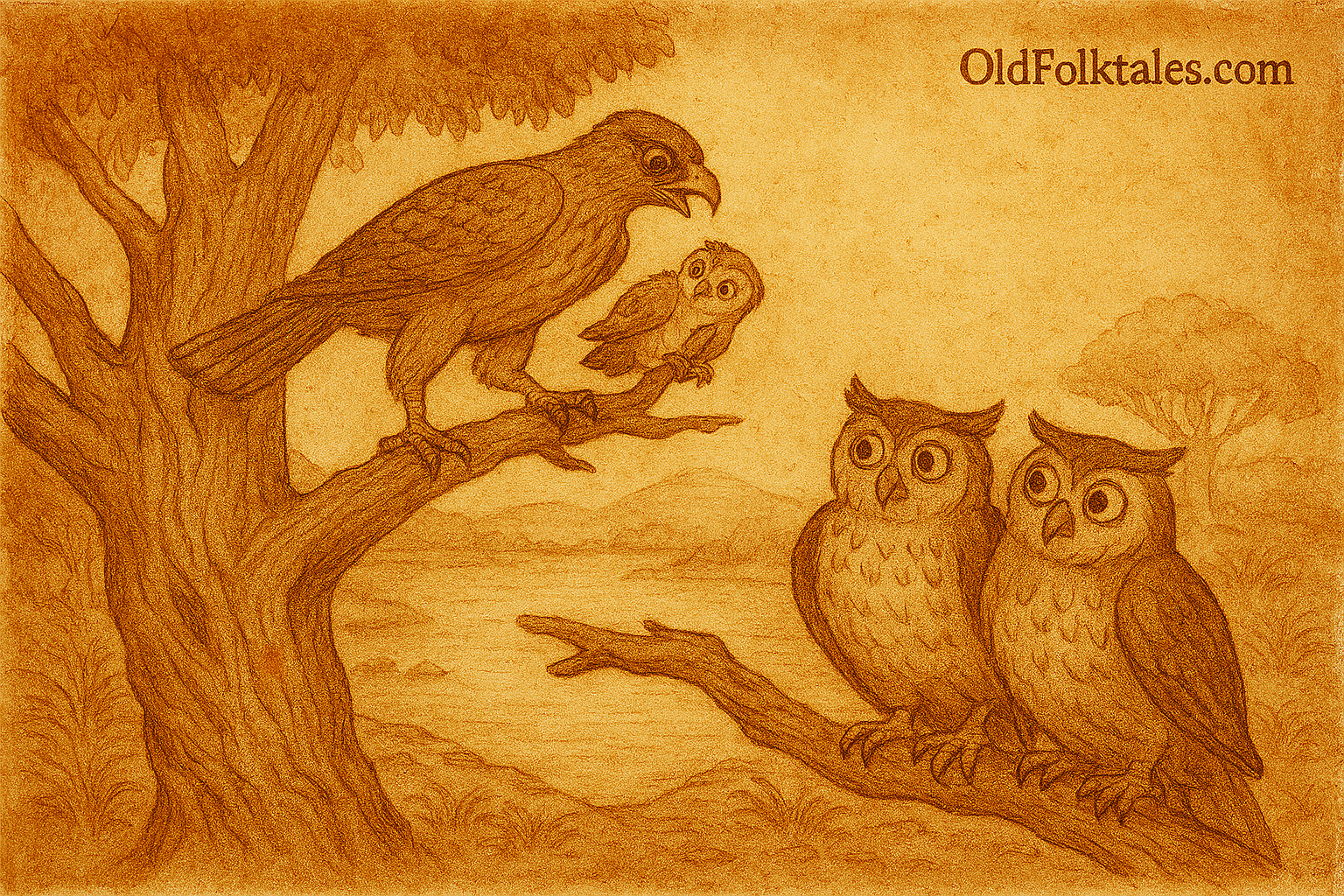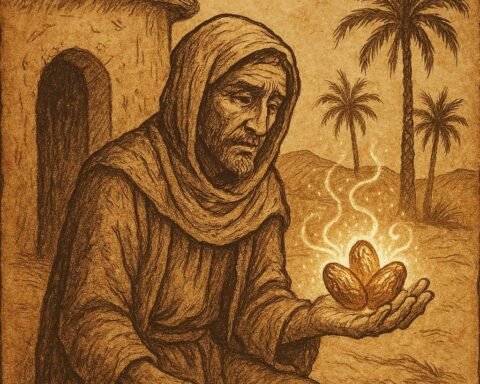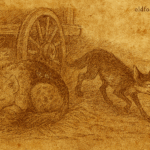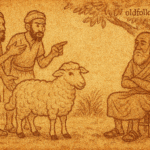Long ago, in the ancient kingdom of Calabar, when the great King Effiong ruled over all the land, there lived a time of remarkable harmony between all living creatures. The king’s reign was marked by grand celebrations and magnificent feasts that brought together an extraordinary gathering, not only his human subjects but every bird that soared through the African skies, every animal that roamed the dense forests, and every fish that swam in the rushing rivers and quiet streams. All of creation bowed before King Effiong’s wisdom and authority.
Among all his messengers, none was more trusted or valued than the hawk. With wings that cut through the air like arrows and eyes that could spot movement from great distances, the hawk had served as the king’s most reliable courier for many years. His powerful talons and swift flight made him the perfect choice for urgent missions across the vast kingdom.
As seasons passed and years accumulated like fallen leaves, the faithful hawk began to feel the weight of age settling into his bones. His once-effortless flights now required more effort, and he knew that soon his days of royal service would come to an end. With the respect earned through years of loyal duty, the hawk approached King Effiong to discuss his retirement.
Also read: The Drummer and the Alligators
“Great king,” the hawk said, bowing his magnificent head, “I have served you faithfully through many seasons, but I feel my strength beginning to wane. What provisions will you make for my old age, when I can no longer carry your messages across the kingdom?”
King Effiong, wise in the ways of rewarding faithful service, considered the hawk’s request with the gravity it deserved. After a moment of thoughtful silence, he made a generous decree: “Bring me any living creature, whether it flies, walks, or swims, and from that day forward, you shall have my royal permission to hunt and feed upon that species for the rest of your days, without fear of punishment or interference.”
Grateful for this opportunity to secure his future, the hawk spread his powerful wings and began his search across the sprawling landscape. He soared over rolling hills covered in dense vegetation, glided through ancient forests where sunlight filtered through thick canopies, and surveyed vast stretches of savanna dotted with acacia trees. For hours he searched, his keen eyes scanning every branch and shadow.
Finally, in a towering tree whose branches reached toward the heavens, the hawk discovered a young owlet that had tumbled from its nest. The small, fluffy creature sat helplessly on the ground, its large, round eyes blinking in confusion. Without hesitation, the hawk swooped down and gently but firmly grasped the owlet in his talons.
When he presented his choice to King Effiong, the ruler nodded with approval. “So be it,” declared the king. “From this day forward, you may hunt owls without restriction.” The hawk’s heart soared with relief and gratitude as he carried the young owlet away from the royal court.
Eager to share his good fortune, the hawk sought out his wisest friend among the bird community. But instead of the congratulations he expected, his friend’s expression grew grave and thoughtful.
“Tell me, my friend,” the wise bird said slowly, “when you seized this young owlet, how did its parents react? What sounds did they make? What actions did they take?”
The hawk, puzzled by the question’s seriousness, replied honestly: “They remained completely silent. The father and mother owls watched from their perch but made no sound at all. They offered no resistance, no cries of protest, nothing.”
The friend’s feathers ruffled with concern. “This silence troubles me deeply,” he warned. “You must return this owlet to its parents immediately. Those who remain quiet when wronged are often the most dangerous enemies. While creatures that make noise and commotion exhaust their anger in the moment, those who suffer in silence are usually planning something far more terrible. The owls’ stillness suggests they are plotting a revenge more cruel and cunning than you can imagine.”
Though reluctant to give up his secured future, the hawk trusted his friend’s wisdom. The next morning, as the first rays of sunlight painted the sky golden, he flew back to the great tree and carefully placed the unharmed owlet near its nest. The parent owls watched this return in the same unsettling silence, their large eyes following his every movement.
Now faced with finding alternative prey, the hawk discovered that word of his initial choice had spread throughout the animal kingdom. Birds of every species had heard about the incident and now viewed him with suspicion and fear. Wherever he flew, creatures scattered and hid. The forest seemed to empty before his approach, leaving him unsuccessful and increasingly frustrated.
As the sun climbed higher in the sky, the hawk’s sharp eyes spotted a peaceful domestic scene near a traditional compound. A flock of chickens basked contentedly in the warm dust, their feathers gleaming in the sunlight as they scratched and pecked at the ground. Several small chicks scurried about on quick legs, chasing insects and pecking at seeds, while their vigilant mother hen kept watch, occasionally clucking gentle warnings or encouragement.
The sight of these plump, seemingly defenseless creatures made the hawk’s decision for him. He circled once, then dove with the speed and precision that had made him the king’s favorite messenger. His talons closed around the smallest chick, and instantly the peaceful scene erupted into chaos.
The roosters began crowing alarm calls that echoed across the compound, their voices raised in urgent warning. The mother hen, her feathers puffed out in fierce maternal rage, chased after the hawk with surprising speed and determination. She called out desperately for her stolen child, making brave swooping attempts to force the much larger predator to release his prize. The remaining chickens scattered in terror, some disappearing into houses, others diving under bushes, and many more frantically seeking refuge in the tall grass that bordered the compound.
Despite the mother’s valiant efforts and the cacophony of protest from the entire flock, the hawk successfully carried the chick to King Effiong. He explained his decision to return the owlet, expressing that he preferred not to make owls his prey. The king, satisfied with this alternative choice, granted the hawk permission to hunt chickens for the remainder of his days.
When the hawk returned home with his prize, his wise friend visited to hear the outcome of this second attempt. “And how,” asked the friend, “did the parents of this chicken respond when you took their child?”
The hawk described the scene: “They created an enormous commotion! The mother hen chased me with great courage, the roosters crowed warnings, and all the chickens ran about making tremendous noise. The entire compound was in uproar, but ultimately nothing came of it.”
His friend nodded with satisfaction and relief. “Then you have chosen wisely this time,” he declared. “Those who make great noise and display their anger openly in the daylight hours will exhaust themselves with their protests. They will sleep soundly at night and cause you no further trouble. But always remember to fear those who, when wronged, remain silent and still. Their quietness signals that they are plotting revenge, and they will certainly strike when darkness provides them with cover and advantage.”
Moral Lesson
This ancient Nigerian folktale teaches us that we should be more wary of those who respond to conflict with silent contemplation rather than loud protest. People who express their anger immediately may be easier to understand and deal with, while those who remain quiet might be planning a more calculated response. The story reminds us to consider the different ways people process hurt and to recognize that silence can sometimes be more dangerous than noise.
Knowledge Check
Q1: Who was the king in this Nigerian folktale and what made his kingdom special? A: King Effiong ruled the kingdom of Calabar, and his kingdom was unique because all living creatures, humans, birds, animals, and fish were his subjects and attended his grand feasts together.
Q2: Why did the hawk need to find a creature to present to the king? A: The hawk was aging and wanted to retire from his messenger duties. King Effiong promised that whatever creature the hawk brought him would become the hawk’s permanent prey, ensuring food security for his old age.
Q3: What was significant about the owls’ reaction when their chick was taken? A: The parent owls remained completely silent and made no noise or protest, which the hawk’s wise friend interpreted as a sign that they were plotting dangerous revenge rather than expressing their anger openly.
Q4: How did the chickens’ parents react differently from the owls? A: Unlike the silent owls, the chickens’ parents created a loud commotion, the roosters crowed alarm calls, the mother hen chased the hawk courageously, and all the chickens scattered while making noise, showing their immediate emotional response.
Q5: What does this folktale teach about different responses to conflict? A: The story teaches that people who express anger loudly and immediately may be less dangerous than those who remain silent when wronged, as silence often indicates calculated planning for revenge rather than emotional release.
Q6: What role does the wise friend play in this Nigerian folktale? A: The wise friend serves as the voice of experience and caution, helping the hawk understand that quiet reactions to wrongdoing can be more threatening than loud, immediate protests, ultimately saving the hawk from potential danger.
Source: Nigerian folktale from the Efik people of Calabar, Cross River State, Nigeria






